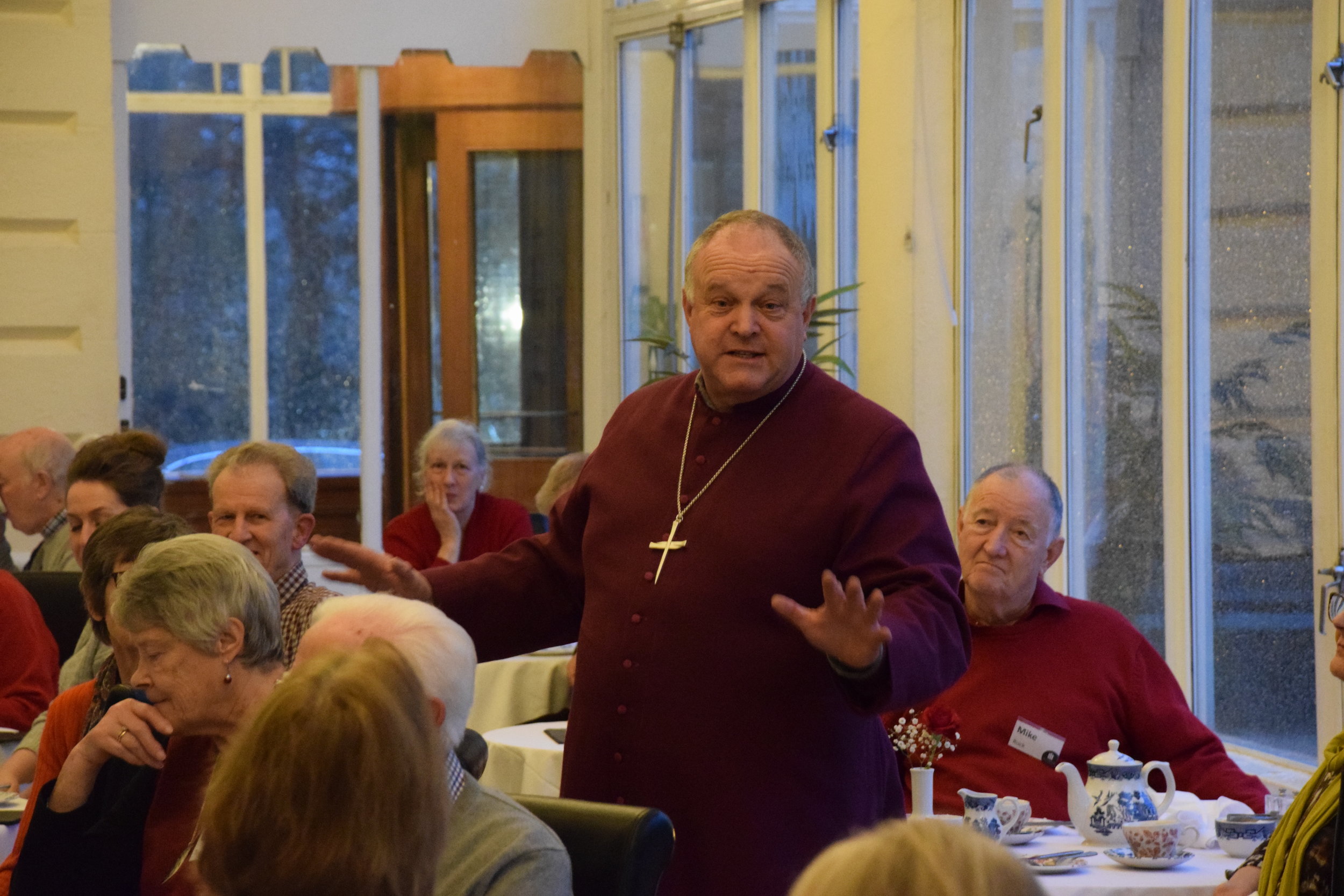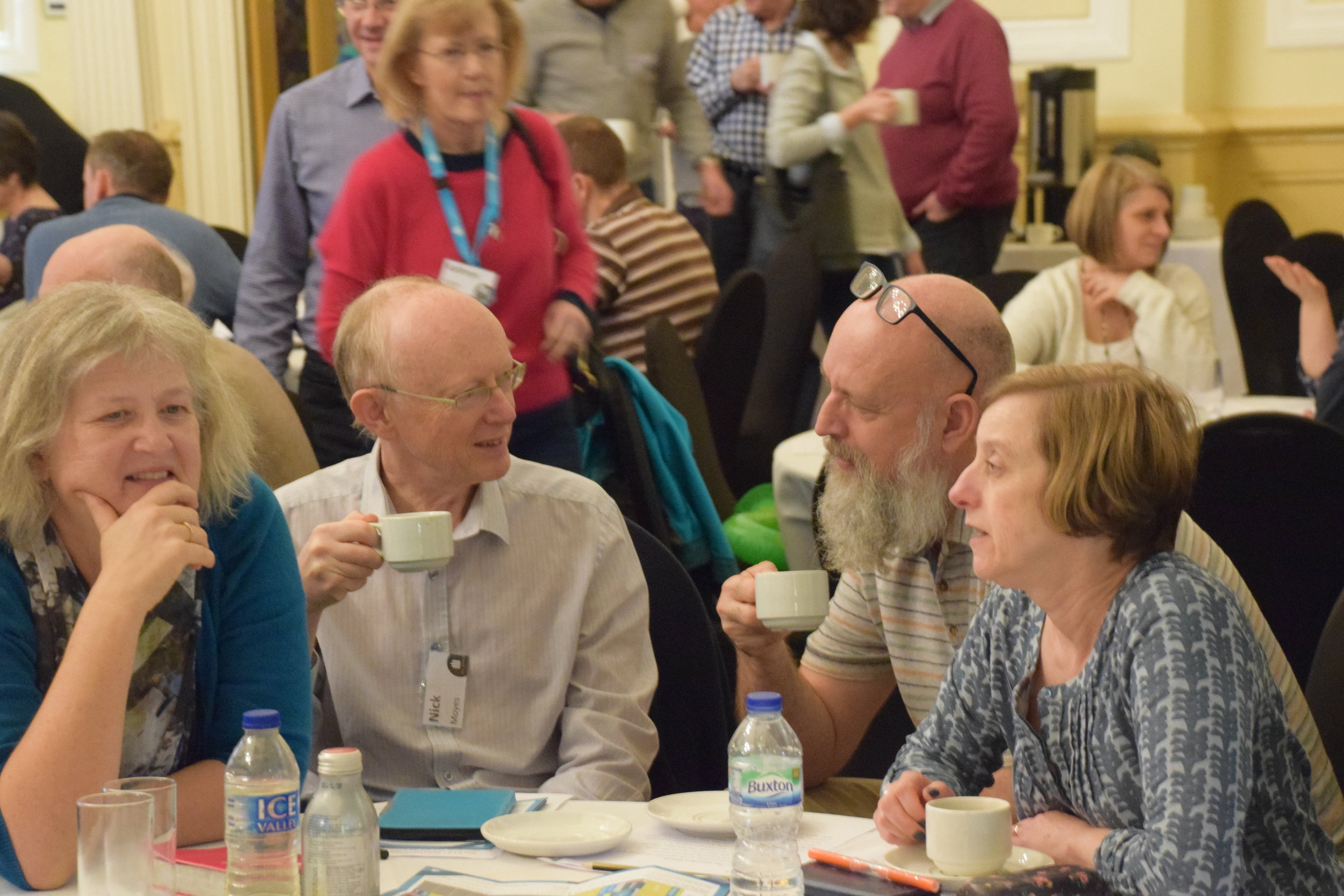Welcome to a Bumper February edition of From the Vicar. On Sunday 27 January we launched our Bible verse for 2019
“And let us consider how we may spur one another on toward love and good deeds, not neglecting to meet together, as is the habit of some, but encouraging one another, and all the more as you see the Day approaching.”
Hebrews 10:24-25
It is a wonderful verse, full of encouragement and hope for both the good days and the difficult days. It also reminds us that meeting together is important – and that time is very precious indeed. It was especially appropriate to launch this particular verse on a Sunday when we were meeting both here at All Saints and at the Palace Hotel in Buxton.
Here at All Saints I was thrilled that Karen Cribb agreed to lead our Holy Communion service, while all our clergy were away, and that the church building continued to be open for the prayer and the praise of the Living God. I was pleased, not least, because the right back in the 13th century the canons of Beauchief Abbey founded All Saints for the very purpose of public prayer. Keeping the church open was all about being faithful to our calling. I was also thrilled because three new people attended and introduced themselves to the welcome team.
Just half an hour behind the All Saints service at 10.30am we were celebrating Holy Communion in Buxton at 11.00am. Unusually in Buxton we offered two offertory prayers – the first accompanied a model of the church made up of single pieces of lego we had each held for our intercessions. The lego model of the church was multi-coloured and made up of hundreds of pieces – of different shapes and sizes. Some parts of the model, stood strong, others stood tall, while others were a bit wobbly and even fell over. In some ways it was a very beautiful picture of the church with all our differences, strengths, weaknesses and brokenness – all called to serve and worship the same living God.
The second offertory prayer accompanied the financial gifts offered to help church family members to attend the weekend. The total cost of the Big Church Weekend was around £37,000. At the beginning of the weekend we had paid and donated around £29,000 + some Gift Aid. Our opening total also included a very generous grant of £3,000 from Whirlow Grange Ltd. During the course of the weekend we gave an additional £6,000. My hope is that, with a few more donations and with some Gift Aid we will fully meet the cost of the weekend, perhaps with some funds left over to offer to support a day away or weekend away for another church family. If you are still wanting to donate, please contact the office or use the Big Church Weekend donation page on the church website.
I have returned to Ecclesall full of thanksgiving to God for the weekend: for the children and youth ministry, for the worship, for the teaching, for the fellowship, for the fun and for all our safe travelling. To God be the Glory. During the course of the weekend I expressed our thanks and appreciation for our amazing staff team, our speaker Daniel McGinnis and our chaplains David and Helen Williams. I also want to underline our thanks to all the volunteers who helped to make the weekend so special:
Anne Hunter and Eric & Sue Phillips for agreeing to be part of the organising committee.
Lynne Quinney (Myers- Briggs),
Mary Wragg (The architecture of Buxton) and
Jo Hird ( Journeying with Bereavement) for their inspiring workshops.
Joy Adams for leading morning and evening prayer, for organising the prayer room and for being available to meet with people one to one.
Janet Griffin, Chris Medd, Theresa Morrison, Beth & Dave Stout and Dan Christian for organising the wonderful gala dinner and ball on the Saturday evening.
Stephen Hunter for acting as master of ceremonies for the Ball and the Bishop’s Tea Party.
Our student team of helpers and baby-sitters from Cliff College: Mandey Hadley, Bryn McGlashan, Daniel Hughes, William Hepworth as well as Daniel Adock from St Columbas.
Children’s ministry leaders for providing ways for our children to engage with God through`out the weekend: Rosie Blackett, Rob and Cath Liley and Dan Christian. Thanks also to Rosie for coordinating the babysitting on Friday and Saturday nights.
Our Youth team for the sessions through the weekend as well as providing space and time for our young people to hang out: Joseph Sheldon, Hannah Chester, Sam Chubb, Emily Jackson, Ross and Emma Draper.
Our musicians and singers including Ali Burke, Jane Robinson, Matthew Redfern, Emma Radford, Ben Hartley, Beth & Dave Stout, David Onac and Alistair Stevenson
Our operations team: Rachel McLafferty and Daniel Tarrant.
Last but not least, our thanks go to all those who helped staff the reception desk.
One of the joys of the weekend was the teaching offered By Daniel MGinnis. He gave us a fascinating whistle stop tour of the book of Acts with a particular focus on the different churches in Jerusalem, Antioch and Ephesus. His power point presentations were sent out via the weekly email this earlier week, if you would like to read through them. On the Friday evening Daniel gave us an overview of the cultural background to Acts – not least helping us to grapple with the multi-cultural and multi-religious nature of the Roman Empire. And I for one, did not know that the city of Rome has a population of 1 million. While Antioch and Ephesus each had populations of 500,000.
On the Saturday morning we explored the life of the churches in Jerusalem, Antioch and Ephesus. Here Daniel helped us to see how the apostles went about planting new churches where they were known and where they had relationships. Indeed he was very clear that Acts is all about Church-planting. Very wonderfully Daniel made his first visit to All Saints on the day we laid on hands and sent the team to St Gabriel’s Greystones. He reminded us that this was very much the pattern in Acts and encouraged us to consider planting more churches in the future.
Over the past year I have been meeting with the Bishop’s team and the leaders of the larger churches to think through the role of ‘resourcing churches’ in the life of the diocese. Having discussed a first draft of a Memorandum of Understanding just before Christmas I was thrilled to receive the latest draft just as I was standing at the door welcoming people to the Big Church Weekend. I have the Bishop’s permission to share it widely, so I have included it in this bumper edition of ‘From the Vicar’. We will not be rushing into any decisions and I will be welcoming lots of input from the Church Family. So watch this space.
At the end of the Big Church Weekend, members of the Church Family of all generations expressed just how much they had enjoyed being together. Indeed some of the children told me that they didn’t want to go home (Congratulations - Children & Youth leaders). While others wanted to know when were we planning the next church weekend away (Congratulations - Rachel McLafferty).
In the meantime let us consider how we may spur one another on toward love and good deeds, not neglecting to meet together, as is the habit of some, but encouraging one another, and all the more as you see the Day approaching.
A Draft Memorandum of Understanding
for the Bishop of Sheffield,
the Sheffield Diocesan Board of Finance
and a Parochial Church Council (or other governance body)
to enable the identification of ‘Resourcing Churches’
in the Diocese of Sheffield
In the Diocese of Sheffield, a ‘resourcing church’ is defined as a church which
* has been formally designated as such, at the invitation of the Bishop of Sheffield and with the agreement of the Parochial Church Council
* has entered into a formal understanding with the Bishop and the SDBF to further the Diocesan Strategy, by committing itself to a programme of church planting in negotiation with the Bishop’s senior staff
* has agreed in good faith an indicative timescale for the next plant and a process for agreeing a favoured location
In developing and deploying Resourcing Churches, the Bishop of Sheffield will:
a) give priority to the leaders of resourcing churches in the placing of curates for training, with a view to curate-led plants at the end of the training period
b) meet termly with the leaders of resourcing churches to provide updates and to seek advice on the implementation of the Diocesan Strategy
c) liaise closely with the leaders of resourcing churches in the creation and training of a pipeline of interns, lay pioneers, lay focal leaders and ordinands to sustain the future programme of church planting
In undertaking its responsibilities, the PCC of a resourcing church will
a) commit to a minimum of one church plant every five years, involving at least 25 people with a designated lay or ordained leader
b) work closely in partnership with the Bishop in the identification and training of potential church plant leaders, especially when these are not SDBF curates
c) engage seriously with the strategic priorities of the Diocese in agreeing potential locations for future church plants
d) support the implementation of the Diocesan Strategy and the culture change it requires, by contributing to training, discipling and the nurturing of gifts
In addition, the senior leaders of a resourcing church will meet termly together with the Bishop of Sheffield and/or members of his senior staff in order to shape the continuing development of the Diocesan Strategy.
+Pete, January 2019





